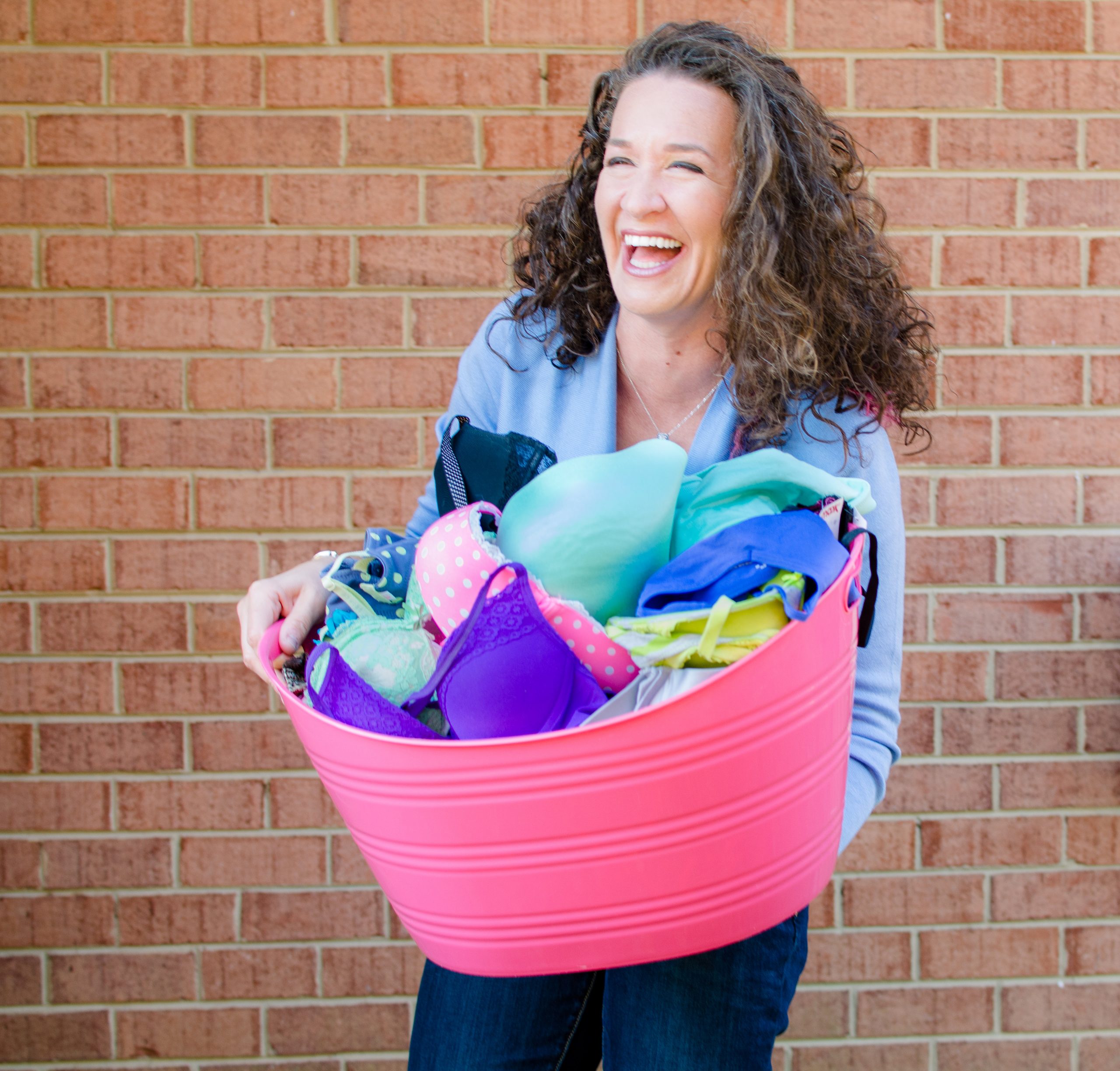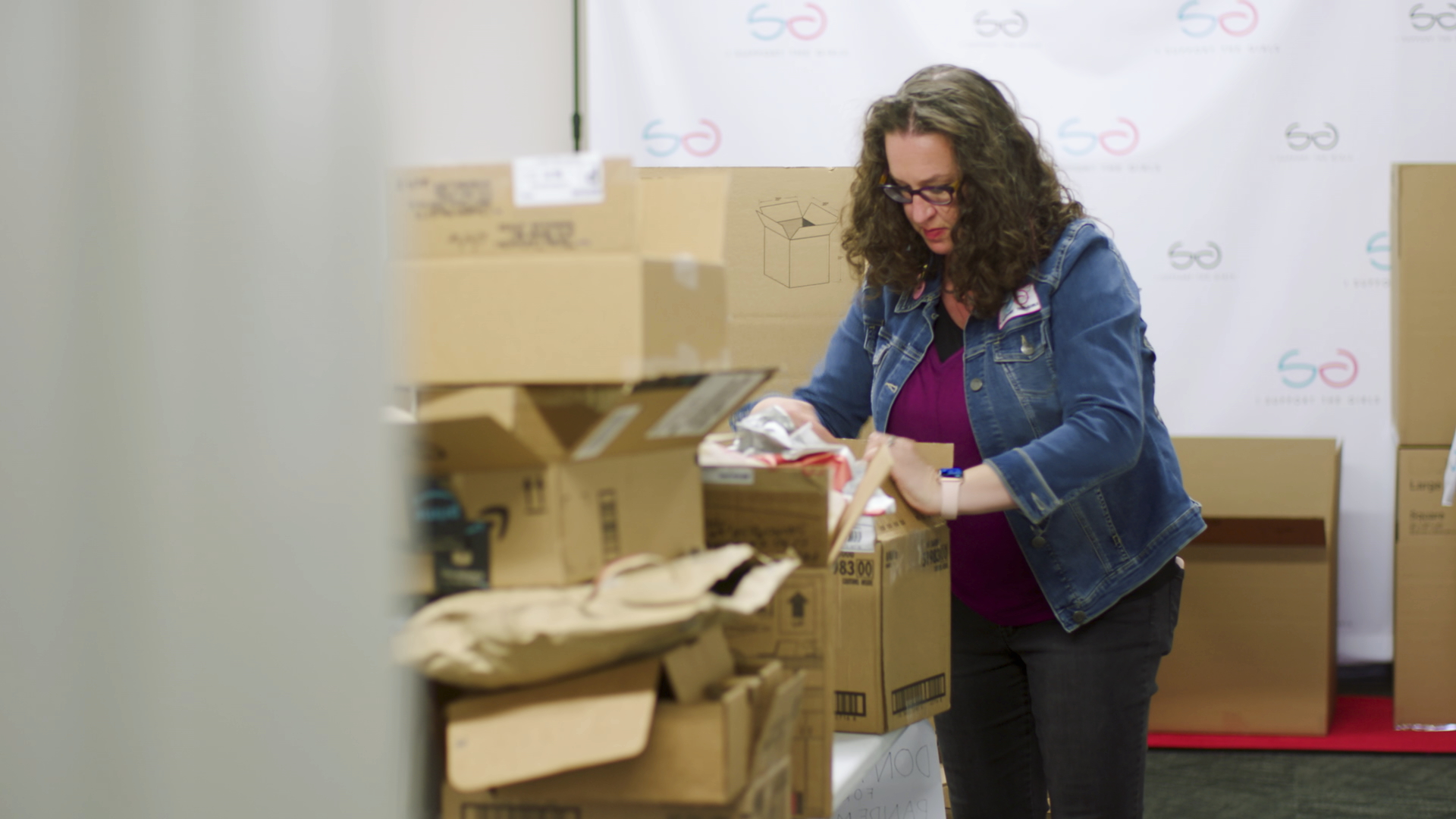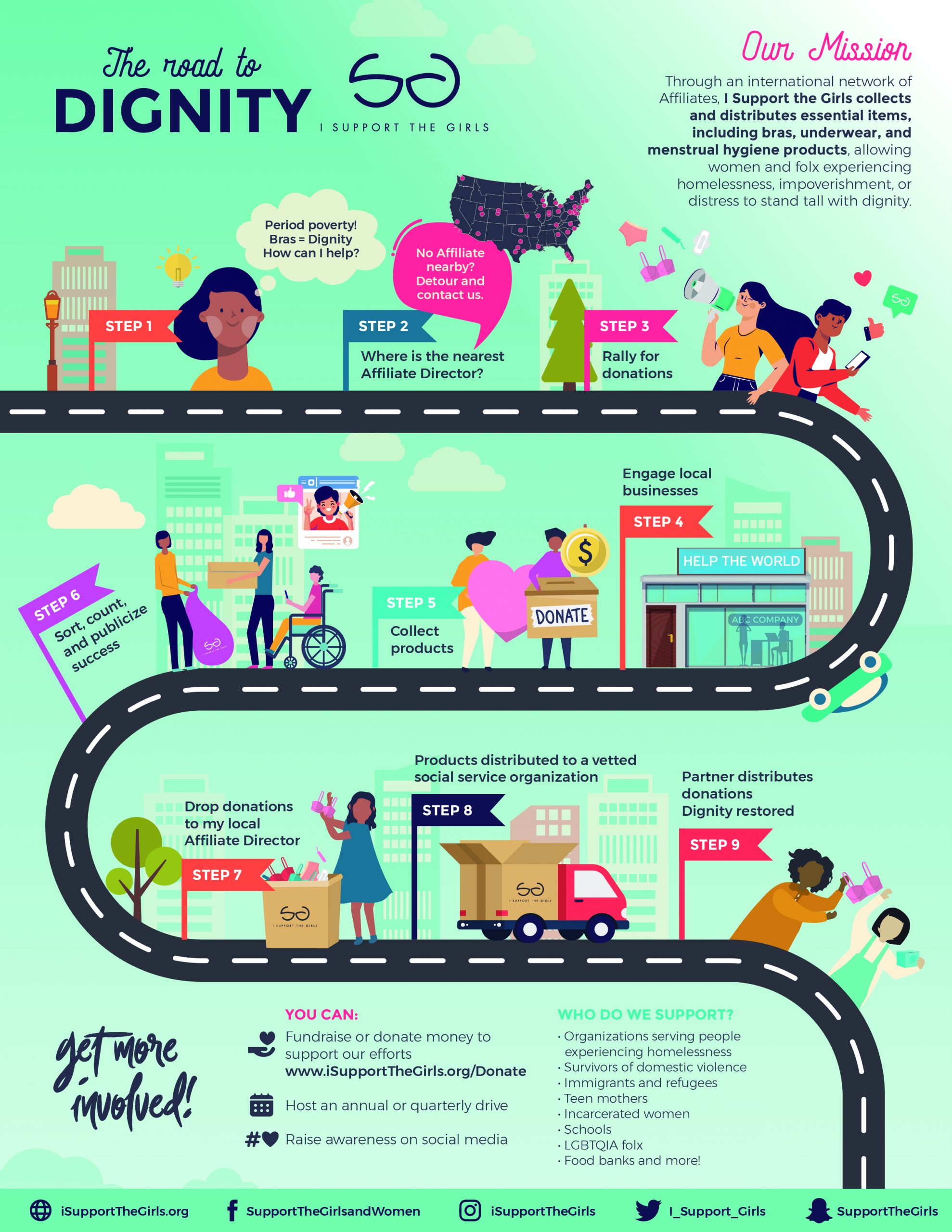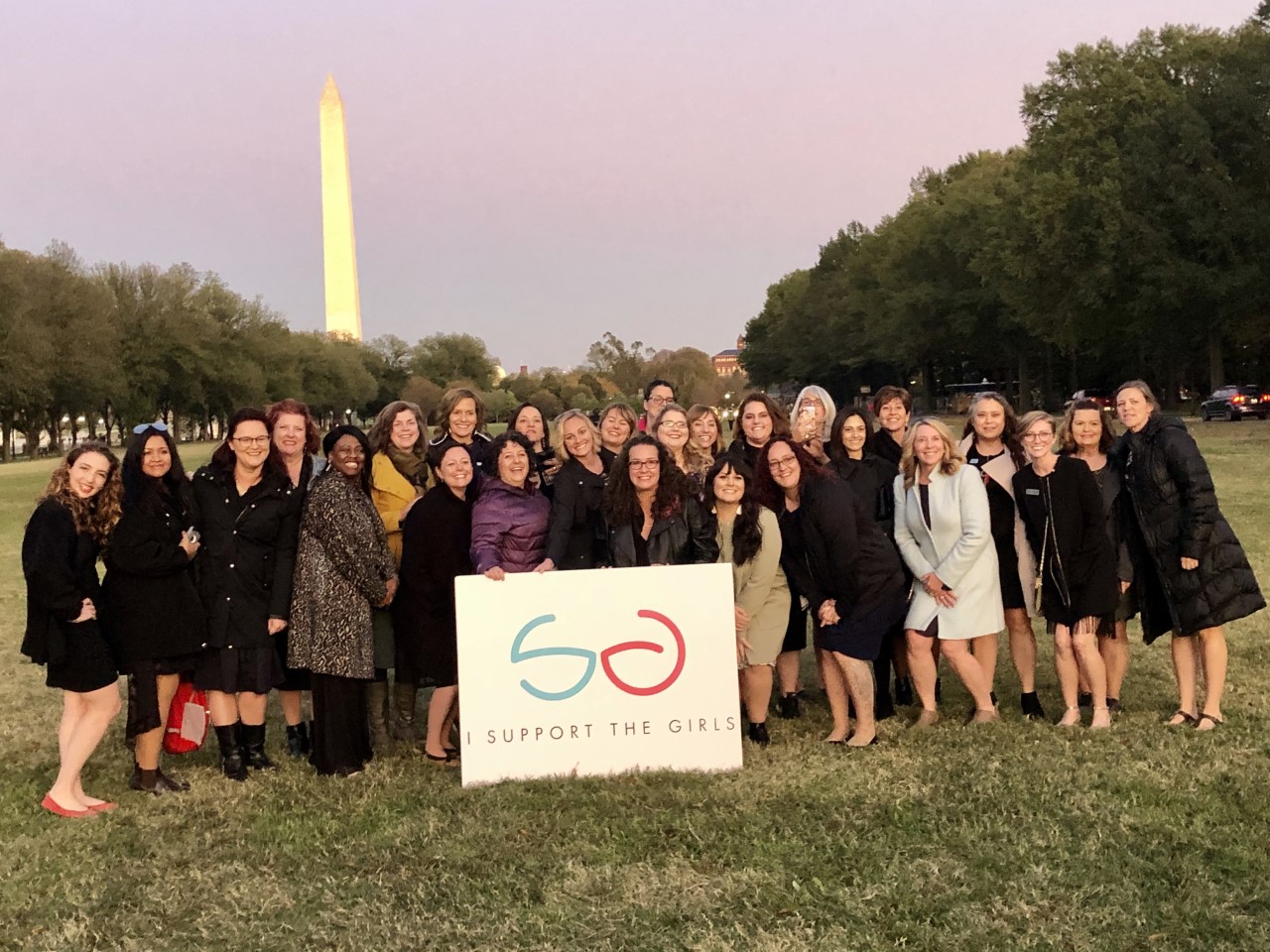Addressing period poverty and health in those experiencing homelessness, impoverishment, or distress
How I Support The Girls is working within communities to restore dignity and agency to women, girls, and menstruators
“I donated clothing, shoes, books, furniture, etc., but I didn’t know that I could open up that top drawer and donate bras. So then I said, ‘What else do y’all need?’,” – Dana Marlowe, Founder and Executive Director of I Support the Girls.
 Menstruating while Homeless
Menstruating while Homeless
Periods don’t stop for those experiencing homeslessness, distress, or impoverishment. The average woman spends about $120 per year on menstrual hygiene products including pads, tampons, or panty liners. This cost proves to be a financial burden for many. According to a 2019 ACLU report, lack of menstrual products and support can contribute to loss of educational opportunity for impoverished teens and many menstruators experiencing homeslessness have reported infection caused by prolonged use or improvisation of menstrual products. In 2019, 29% of the U.S. homeless population was female, and less than 1% was transgender or gender non-conforming. These menstruators are often left with minimal support from publicly funded schools, shelters, and crisis centers that can’t designate menstrual hygiene products as budgetary expenses due to public health policy and monetary restrictions. This underfunding coupled with general lack of awareness in donors leads to a serious public health issue.
I Support the Girls supports menstruators and women in need by donating to food pantries, shelters, crisis centers, native reservations, prisons, and correctional facilities to support veterans, refugees, LGBTQ+ youth, and men.
 I Support the Girls’s Approach
I Support the Girls’s Approach
I Support the Girls began in 2015 with a simple post on founder Dana Marlowe’s Facebook page. It has since grown into a global nonprofit with a network of 58 affiliates and nearly ten million donations to date. The organization focuses on dignity for women, girls, and people in need of menstrual hygiene products and undergarments. By collecting and donating items locally, ISTG aims to empower people in need in different communities.
Though ISTG launched as an official nonprofit in 2016, Marlowe got the idea for the organization a year prior when she went to her local Soma store to get new bras fitted. There she learned that her gently used items could be donated to homeless women who need bras, monthly menstrual products, and toiletries often unavailable in shelters.
“Your period’s not going to stop because you’re experiencing homelessness. I thought ‘what it must be like to have to decide, ‘Am I going to get that hot meal? Or am I going to buy that package of tampons?’.” Marlowe said.
Marlowe’s bag of 16 bras quickly grew into a donation of more than 8,000 products with contributions from all over the U.S. ISTG continues to empower women and those who menstruate by distributing essential items and supporting their ability to “stand tall with dignity.”
 I Support the Girls’s Strategies
I Support the Girls’s Strategies
Affiliate Network: The D.C. based nonprofit works with its network of nearly 60 affiliates to achieve its mission of collecting and donating locally. The flagship program operates in 30 U.S. states with international teams in Pakistan, Canada, Philippines, Germany, and across Australia.
 Forces for Change Program: The Forces for Change program focuses on supporting youth transitioning out of foster care systems, those transitioning out of correctional facilities, migrant farmers, LGBTQ+ teens and adults, and other individuals or organizations in need. ISTG partners with school districts; federal, state, and local facilities; and corporate partners to meet unique product needs and create long-term change through advocacy.
Forces for Change Program: The Forces for Change program focuses on supporting youth transitioning out of foster care systems, those transitioning out of correctional facilities, migrant farmers, LGBTQ+ teens and adults, and other individuals or organizations in need. ISTG partners with school districts; federal, state, and local facilities; and corporate partners to meet unique product needs and create long-term change through advocacy.
Disaster Relief Program: The Disaster Relief initiative fills gaps that may be left by large relief organizations that don’t have resources to devote to menstrual hygiene products and bras. ISTG has donated more than 600,000 products to those affected by flooding, hurricanes, wildfires, and other natural and economic disasters.
COVID-19 Response: The coronavirus pandemic continues to pose challenges for everyone, including menstruators on the streets, in makeshift shelters, hospitals, sheltering in place, or experiencing new economic hardship. ISTG has seen a 35% increase in requests since March, and has responded swiftly by collecting and distributing more than 2 million products. ISTG donated hundreds of thousands of products to Trenton, New Jersey and the city of Los Angeles’s emergency COVID response teams and has been working nonstop to address need for students and those in shelters.
I Support the Girls’s Best Practices
Trial Period & Vetting Process: ISTG affiliates must reach out to the organization individually and undergo a detailed vetting and training period before getting starting work. Marlowe and her team developed guidelines for new directors who work with Rachael Heger, Director of Affiliate Outreach for a three-month trial period before receiving official designation. The process has proved to increase success and encourage a deeper understanding of local issues and best practices.
“It’s beyond just hosting a collection and a drive,” Marlowe said. “There’s other elements that need to be considered and factored in.”
Ensuring accountability on both sides, ISTG also vets the social organizations receiving products, with over 2,000 partnerships to date.
Testing & Iteration: After the inundation of donations from Marlowe’s original post, the now executive director decided to test her model before its official debut. Marlowe ran pilot studies from December 2015 to February 2016 in Potomac, Indianapolis, Cleveland, and Knoxville to see if outcomes would change in the absence of her and her generous network.
“When you’re coming up with a hypothesis, you have to vet it,” Marlowe said.
When each of the pilot studies came back equally successful, the official work began. Recognizing the value of different perspectives, Marlowe brought in business strategists, nonprofit leaders, operations managers; PR, marketing, and startup professionals; lawyers, and accountants in March of 2016 for a round-the-clock moderated session to discuss expanding into a legitimate organization. Once the legal process was complete, ISTG started to receive wide media coverage and integrated their first U.S. and international affiliates in Indiana and Australia, respectively.
Advocacy & Awareness: Marlowe maintains her commitment to the cause by leading workshops and speaking engagements to raise awareness for menstrual equity. Marlowe has spoken at the Coca-Cola Company’s annual women’s conference, prestigious universities, the U.S. State Department, and many more notable conferences and events. The ISTG team takes part in lobbying efforts on behalf of those experiencing homelessness and to advocate for tampon tax removal in remaining U.S. states and abroad.
 Challenges Faced
Challenges Faced
Fundraising: ISTG is growing at a fast pace, but any organization wanting to make a greater impact needs more resources. The organization has supported communities in all 50 states and across six continents, but faces expensive tariffs and shipping rates when exporting abroad. The COVID-19 pandemic has brought new challenges and opportunities for funding through grants and large corporate donations.
Vision for the Future
Marlowe is eager to continue to grow ISTG’s network and impact for people who menstruate around the world and eliminate obstacles they may face.
[My vision is] to be able to continue to break down barriers around menstrual taboos, work hard on making sure that for folks in need that menstrual equity is a real thing and that they have access to the products they need to live a fulfilling life or have a fulfilling education or a fulfilling job,” Marlowe said.
Dana Marlowe is the Founder and Executive Director of I Support the Girls.
To learn more about I Support the Girls please visit: https://isupportthegirls.org/.

